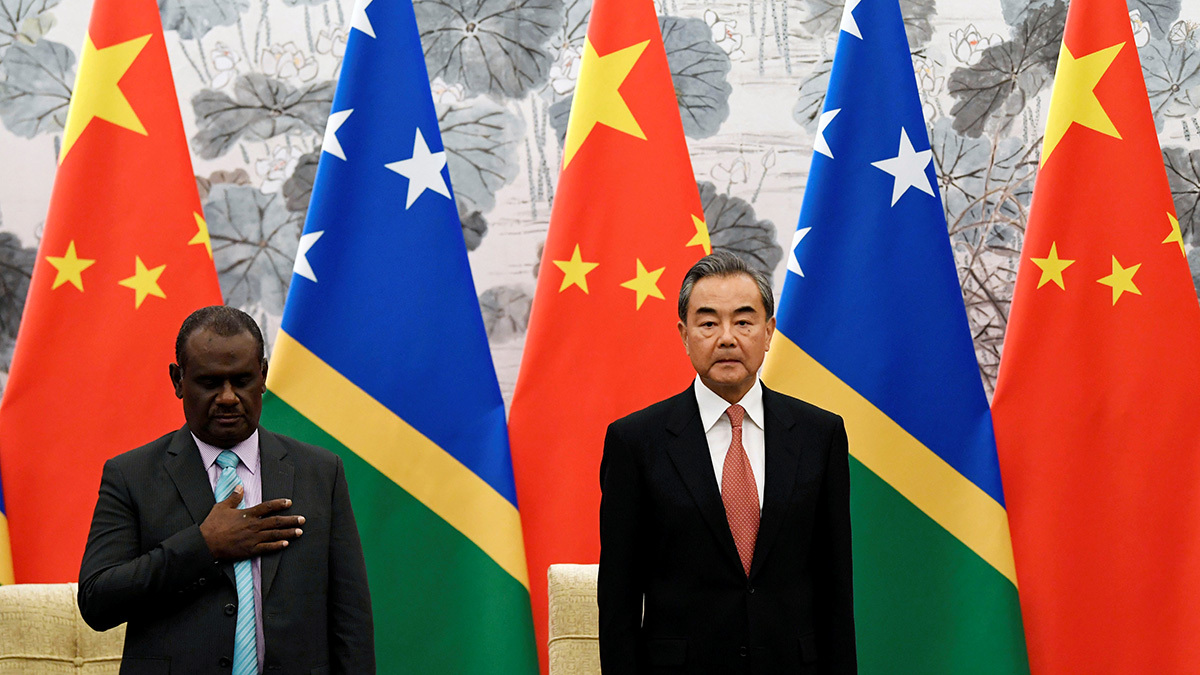The Solomon Islands And China Sign Various Deals
Context
- The leaders of China and the Solomon Islands pledged to deepen their ties, which have caused anxiety in Australia and the United States over Beijing’s influence in the South Pacific.
- Premier Li Qiang and Prime Minister Xi Jinping of China met with Prime Minister Manasseh Sogavare. The contracts were signed under the supervision of Mr Li and Mr Sogavare and dealt with technological, economic, and police cooperation.

Solomon Islands
- Geography: Geographically speaking, Melanesia, a component of Oceania, is where the Solomon Islands are situated. More than 900 tiny islands make up its six larger islands. About 28,400 square kilometres (11,000 square miles) of land make up the entire nation. The largest island, Guadalcanal, is where Honiara, the capital, is located.
- Population: About 700,000 people are living in the Solomon Islands. Indigenous Solomon Islanders, descended from the Lapita people and other waves of migration, make up the majority of the population.
- Early Settlement: The Lapita people were one of the first indigenous groups to live on the islands, which have been inhabited since at least 30,000 to 28,800 BCE. The contemporary indigenous population of the Solomon Islands was created via the mingling of these early settlers.
- European exploration: Lvaro de Mendaa, a Spanish sailor, made the first European voyage to the Solomon Islands in 1568. Although Mendaa did not give the islands a name, it is thought that individuals who heard of his expedition afterwards referred to them as “the Solomons.”
- Change of Name and Independence: In 1975, the British administration’s official name was changed from “British Solomon Islands Protectorate” to “The Solomon Islands.” In 1976, self-government was attained, and complete independence followed in 1978. Charles III became the King of the Solomon Islands and was represented by a governor-general when the nation transitioned to a constitutional monarchy.
What is the relation between Solomon and China?
- History:
- The Solomon Islands and the Republic of China (Taiwan) had diplomatic ties from 1983 until 2019.
- 2019 saw the decision by Prime Minister Manasseh Sogavare to sever ties with Taiwan and open diplomatic channels with the People’s Republic of China (PRC).
- Lease of Tulagi:
- A lease for the entire island of Tulagi was signed between a Chinese state-owned corporation, China Sam Enterprise Group, and the Tulagi province government in September 2019.
- The Solomon Islands attorney general eventually annulled the deal because of legal problems and a lack of key information.
- Security Pact:
- China and the Solomon Islands inked a drafting security pact in March 2022, allowing the Solomon Islands to ask China for assistance in upholding social order and safeguarding people’s lives and property.
- The agreement also discusses utilising the Chinese military to safeguard Chinese workers and important projects in the Solomon Islands, as well as allowing Chinese ships to dock and restock supplies there.
- Wang Yi’s visit:
- In May 2022, as part of a trip to the Pacific to sign security and trade agreements with a number of minor Pacific nations, China’s foreign minister Wang Yi paid a visit to the Solomon Islands.
- The trip was regarded as a crucial turning point in China’s relations with the Solomon Islands.
- Deal with Huawei:
- The Solomon Islands agreed to accept a $66 million loan from China in August 2022 in exchange for Huawei building 161 mobile phone towers there.
- The Tina Hydro Project loan and this one collectively contributed greatly to the Solomon Islands’ growing national debt.
- Matthew Wale, the head of the opposition, expressed reservations about the loans, particularly the timetable for repayment and Huawei’s right to a cut of profits.
- Additional Activity:
- The Solomon Islands turned away a British Royal Navy ship and a U.S. Coast Guard ship in August 2022, claiming a ban on foreign military ships while they were under evaluation.
- Concerns were expressed regarding the Solomon Islands’ alleged rift with the West in favour of tighter connections with China as a result of this decision.
How is this relationship going to affect India and its allies?
- India: China’s growing influence in the Indo-Pacific area has India concerned, especially in nations like the Maldives, Sri Lanka, and the Solomon Islands right now. India’s interests in the area may face a strategic threat from China if it gains a stronghold in the Solomon Islands. It might have an impact on India’s efforts to balance out China’s influence and maritime security.
- Like India, Australia is worried about China’s growing influence in the Pacific. One of the nations in Australia’s sphere of influence is the Solomon Islands, therefore any considerable Chinese involvement in the area might be considered as a danger to Australia’s economic and security interests. It might exacerbate existing tensions between China and Australia and intensify the current geopolitical rivalry.It could lead to increased tensions between China and Australia and further fuel the ongoing geopolitical competition between the two nations.
- United States: The Pacific area has emerged as a crucial theatre of conflict in the United States’ larger geopolitical confrontation with China. Chinese influence in the Solomon Islands may have an impact on U.S. interests in the Pacific and pose a threat to its regional sway. In order to balance out China’s increasing influence in the region, it might lead the United States to deepen its relationships with nations like Australia and India.
What are the possible ways to Counter these obstacles?
- Groupings: In the current situation, QUADS are more crucial than ever before. The member nations’ cooperation can aid in addressing China’s strategy of establishing bases in island groups. Malabar exercises are beneficial for honing the militaries of the participating nations.
- Strengthen Regional Cooperation: In order to strengthen regional collaboration with nations in the Indo-Pacific region, India, Australia, and the United States can collaborate. This may entail expanding development assistance, strengthening economic connections, and fostering cooperative security programmes. It is possible to balance China’s influence by enhancing ties with nations like the Solomon Islands through diplomatic contacts, trade agreements, and infrastructure development initiatives.
- Infrastructure Development: It’s critical to address the Indo-Pacific region’s infrastructure shortage. India, Australia, and the United States may work together to support environmentally sound, transparent, and financially viable infrastructure development projects that meet local requirements. They may counter China’s Belt and Road Initiative and lessen reliance on Chinese investments by offering viable alternatives.
The geopolitical dynamics in the Indo-Pacific area may be impacted by China’s relationship with the Solomon Islands overall. As they try to safeguard their interests and influence in the region, major nations like India, Australia, and the United States can become more competitive and shrewd in their geopolitical manoeuvring.





